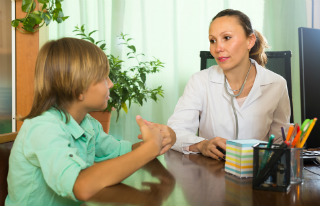Study: On HPV Vaccines, the Message Matters
Researchers find some U.S. physicians “are missing many opportunities to protect today’s young people from future HPV-related cancers.”

If you’re the parent of an adolescent, you may have gotten the message that the HPV vaccine can prevent several types of cancer.
Or, perhaps you
haven’t gotten the message.
In a national survey, many pediatricians and primary care physicians reported communicating about HPV vaccination in ways that may discourage parents from getting their children vaccinated. The study’s lead author, Melissa B. Gilkey, PhD, assistant professor of population medicine at Harvard Medical School and Harvard Pilgrim Health Care Institute in Boston, indicates that many adolescents who should be receiving the vaccination are not.
“We are currently missing many opportunities to protect today’s young people from future HPV-related cancers,” Dr. Gilkey said.
Her study was published in Cancer Epidemiology, Biomarkers & Prevention, a journal of the American Association for Cancer Research (AACR).
HPV vaccines can protect against cervical, anal, vulvar, and vaginal cancers. The HPV vaccine is recommended for girls and boys, and is to be given in three doses, beginning at age 11 or 12. Presently, only 38 percent of adolescent girls and 14 percent of adolescent boys complete all three doses, the study authors noted. Previous studies, the authors explained, have shown that vaccination rates are lowest in the states that have the highest rates of HPV-related cancers.
In Gilkey’s study, she and colleagues, including Noel Brewer, PhD, the study’s senior author and an associate professor of health behavior at the University of North Carolina, conducted a national online survey of U.S. pediatricians and family physicians. The survey, conducted in 2014, measured five indicators of HPV vaccine recommendation quality. They were:
- Recommending vaccination by ages 11 to 12 versus older or not at all, for girls
- Recommending vaccination by ages 11 to 12 versus older or not at all, for boys
- Recommending it for all patients, not just those considered to be “at risk”
- Recommending the patient receive it that day, rather than at a future appointment
- Saying the vaccine is “very” important or “extremely” important, as opposed to a weaker recommendation
The results showed that 26 percent of physicians do not provide timely recommendations for vaccinating girls, and 39 percent don’t provide timely recommendations for boys. About 59 percent of the respondents recommended the vaccination more often for adolescents they perceived to be at higher risk for HPV infections. Only 51 percent recommended same-day vaccination, and 27 percent reported that they do not “strongly” endorse HPV vaccination.
Prior research has shown that a health care provider’s recommendation is the biggest influence on whether parents decide to get the HPV vaccine for their adolescents, Dr. Gilkey said. The researchers therefore undertook the survey in order to assess the way doctors are talking about the vaccine.
They found that when physicians did not emphasize timeliness and urgency, some parents opted to postpone the vaccine. The researchers wrote, “[S]ome parents may interpret weak recommendations as signaling physician ambivalence and decide to forgo HPV vaccination for their children altogether.”
The research also turned up some roadblocks to communication. Almost half the physicians surveyed said they perceived parents’ endorsement of the HPV vaccine to be very low for adolescents in the target age range. Also, many physicians said that discussing sexually transmitted infection was difficult.
“Helping physicians navigate the topic of sex may be an especially important goal,” the researchers noted.
The findings led Dr. Gilkey and her team to three recommended practices for physicians: They should recommend HPV vaccination for all 11- to 12-year-olds, and not just those who appear to be at risk; they should say the HPV vaccine is very important; and they should suggest the patient receive the vaccine at that appointment, not at a later date.
“By improving how physicians recommend HPV vaccine, we can raise national coverage, thereby ensuring that today’s youth enjoy the full benefit of a potent tool for cancer prevention,” the researchers concluded.
Limitations of the study include the fact that physicians self-reported their practices. The study’s authors noted this may have resulted in some overestimation of the quality of their recommendations. Also, this study did not include recommendations from other vaccine providers, such as nurse practitioners and pharmacists, the authors noted.
